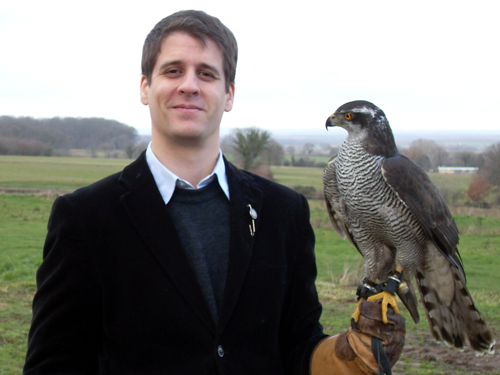
As a specialist in birds and exotic pets, veterinarian Hugues Beaufrère has seen some unusual cases. One he remembers is the African grey parrot who was about 10 years old when she began having seizures.
“The African grey parrots are very intelligent birds, they are as intelligent as chimpanzees,” says Beaufrère. “They are quite long-lived as well. We were able to diagnose this parrot with an MRI and found that she’d had a stroke, which was causing the seizures.” Beaufrère was able to stop the seizures with a combination of medications, and the bird is still alive and doing well several years later. “This is the longest time a bird has been successfully treated for seizures,” he adds.
Beaufrère’s interest in birds started when he was a child. His father was a falconer, and Beaufrère also worked with falcons and other birds of prey. As a university student, he had a Harris hawk that he took out to fly around the campus each day. There was little question that after earning his veterinary degree at the University of Lyon in France, he’d continue his studies to learn more about caring for birds, as well as less-common pets.
His first stop was Guelph, where he completed an internship in avian and exotic animals. Following his internship, Beaufrère started a combined PhD and zoological medicine residency program in the School of Veterinary Medicine at Louisiana State University in Baton Rouge and the Audubon Nature Institute in New Orleans. In 2012, he became a board-certified veterinary specialist in avian medicine both in Europe, through the European College of Zoological Medicine, and in North America, through the American Board of Veterinary Practitioners. Beaufrère obtained his PhD in 2013.
While in Louisiana, he helped treat some of the animals injured in the BP oil spill in the Gulf of Mexico. He provided care for 70 to 80 sea turtles, as well as some rescued dolphins and brown pelicans.
He comments that he has spent more years learning his specialty than he did completing his DVM, but says the extra study is necessary because his practice includes so many species.
“Most small-animal practices look after dogs and cats, and a large-animal vet might look after cows, sheep, horses and maybe pigs,” he says, “but an avian and exotics vet needs to know about hundreds of different species. I saw and treated 10 different species in just the past week, and the animals I see are very different from each other.”
Beaufrère and other vets with his specialty treat birds, small mammals (rabbits, ferrets, guinea pigs, chinchillas and rats), reptiles, amphibians, fish and invertebrates, such as tarantulas.
“You can’t extrapolate most of what you’ve learned about mammals to taking care of birds or reptiles,” he says. “They are so different physiologically.”
His PhD research investigated the problems of cardiovascular disease in captive or pet parrots. “It’s as common in parrots as it is in humans,” he says. That may be partly because they live with humans in environments very different from the natural one.
“Parrots in the wild spend a lot of time flying. They will spend eight to 10 hours a day flying and foraging for food. They also enjoy a varied diet of berries, plant materials, insect larva and some seeds, with a lot of variations among different species of parrots,” he explains. “In captivity, they don’t get to fly, their diet is different and they are under a different kind of stress.” Add to this some genetic predisposition to the disease, and that puts parrots at risk.
Interestingly, female parrots are more likely to develop cardiovascular disease than the males; in humans, the rates are the opposite.
The number of avian and exotic pets brought to veterinary hospitals seems to be increasing rapidly, yet Beaufrère says there are only three veterinarians in Ontario specializing in birds. Other provinces are even less well-served. Beaufrère recalls that when he was at the Ontario Veterinary College (OVC) for his internship, a pigeon owner in Newfoundland flew his pet pigeon to Guelph to be treated.
Students at OVC will do a rotation with Beaufrère at the OVC Health Sciences Centre and learn how cases are diagnosed and treated.
Because he completed his internship here in Guelph, Beaufrère was enthusiastic about returning to take up a clinical position. In addition, his wife, Melanie Ammersbach, is a PhD student here in pathobiology.
OVC’s avian and exotic veterinary service was not available while the position was vacant, but Beaufrère says it is time to let people know this service is once again available. “We are well-equipped with state-of-the-art equipment, and we have a technician, an intern, a resident and students working with me to provide good care for birds and exotic animals,” he says.